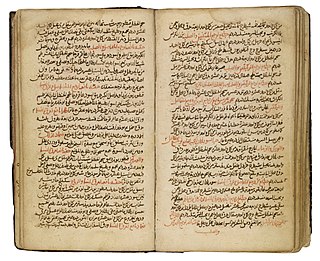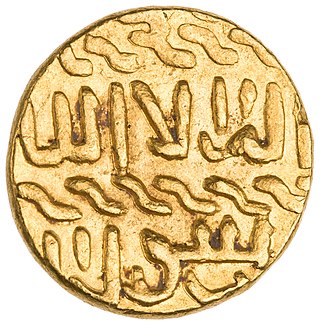Related Research Articles
Idris (I) ibn Abd Allah, also known as Idris the Elder, was an Arab Hasanid Sharif and the founder of the Idrisid dynasty in part of northern Morocco, in alliance with the Berber tribe of Awraba, after fleeing the Hejaz as a result of the Battle of Fakhkh.

Abu Sahl 'Isa ibn Yahya al-Masihi al-Jurjani was a Christian Persian physician, from Gorgan, east of the Caspian Sea, in Iran.

The Afsharid dynasty was an Iranian dynasty founded by Nader Shah of the Qirqlu clan of the Turkoman Afshar tribe.
Qadariyyah, also Qadarites or Kadarites, from qadar, meaning "power", was originally a derogatory term designating early Islamic theologians who rejected the concept of predestination in Islam, qadr, and asserted that humans possess absolute free will, making them responsible for their actions, justifying divine punishment and absolving God of responsibility for evil in the world. Some of their doctrines were later adopted by the Mu'tazilis and rejected by the Ash'aris. They argued that evil actions of human beings could not be decreed by God, as they would have to be if there was no free will and all events in the universe were determined by God.
Manouba is a city in north-eastern Tunisia, and is part the metropolitan area of Tunis, also called "Grand Tunis". It is located at the west of Tunis city center at around 36°48′28″N10°6′4″E. It is the capital city of Manouba Governorate.
Mukhannath was a term used in Classical Arabic and Islamic literature to describe gender-variant people, and it has typically referred to effeminate men or people with ambiguous sexual characteristics, who appeared feminine and functioned sexually or socially in roles typically carried out by women. Mukhannathun, especially those in the city of Medina, are mentioned throughout the ḥadīth literature and in the works of many early Arabic and Islamic writers. During the Rashidun era and first half of the Umayyad era, they were strongly associated with music and entertainment. During the Abbasid caliphate, the word itself was used as a descriptor for men employed as dancers, musicians, and/or comedians.

Ali ibn Muhammad ibn Idris was the fourth Idrisid emir of Morocco.
Abu'l-Aysh ibn al-Qasim Jannun was the twelfth Idrisid ruler and sultan of Morocco. He took over after Al Qasim Gannum in 948 until his death in 954.
Al-Hasan ibn al-Qasim Jannun was the thirteenth and the last Idrisid ruler and sultan of Morocco. He took over after Abu l-Aish Ahmad in 954 until his capture by the Umayyads in 974. He was then exiled to Córdoba, Spain where he died in 985.
Abd al-Hamid ibn Yahya al-Katib was the secretary to the last Umayyad Caliph, Marwan II, and a supreme stylist of early Arabic prose.
Ibn Amira (1186- 1258/60), full name: Abū al-Muṭarrif Aḥmad bin Abdallāh bin al-Ḥusayn bin Aḥmad Ibn Amīra al-Makhzūmī was a historian, poet, and scholar of law from al-Andalus during the reign of the Almohad Caliphate. Ibn Amira was Qadi of Mallorca and worked for the Almohad sultan in Valencia and Seville. He moved to Morocco in 1239/40 and continued to work for the sultan there.
Abu Abdallah al-Husayn ibn Ahmad ibn Hamdan al-Hamadhani, better known simply as Ibn Khalawayh, was a 10th-century scholar of Arabic grammar and Quranic exegesis. He was born in Hamadan. He was active at the court of Sayf al-Dawla, the Hamdanid ruler of Syria, at Aleppo.

Sheikh Izzeddin Esfarayeni, who wrote under the pseudonyms of Hasanoghlu and Pur-e Hasan, was a 13th and 14th century poet who wrote in Azerbaijani and Persian. He is the earliest known author of Azerbaijani literature.
Alyasa in Islam is a prophet of God who was sent to guide the Children of Israel. In the Quran, Alyasa is mentioned twice as a noble prophet, and is mentioned both times alongside fellow prophets. He is honored by Muslims as the prophetic successor to Ilyas (Elijah). Islamic sources that identify Elisha with Khidr cite the strong relationship between Khidr and Ilyas in Islamic tradition.
Nashit was a singer of Persian origin, acquired as a slave by Abd Allah b. Dja'far b. Abi Talib, and who flourished in the second half of the 1st century A.H. in Medina. His Persian style of singing was a great success there, compelling other singers to imitate it, but Nashit himself had to learn the Arab style and songs in order to enlarge his repertoire.
Allawayh al-Asar was a singer of Sogdian origin at the Abbasid court of Harun al-Rashid and his successors. His grandfather, a captive from Sogdia, was a "freedman" (mawla) in Umayyad times. Allawayh al-Asar was a student of Ibrahim al-Mawsili; in contemporaneous sources, he, Ishaq al-Mawsili and Mukhariq were often mentioned together. Allawayh was fond of the style introduced by Ibrahim ibn al-Mahdi, and, according to D. M. Dunlop: "Perhaps we are to see in his introduction of Persian elements into the old Arabic music some indication of national preference". However, by the following century, according to the Kitab al-Aghani, the so-called "traditionalist views" of Ishaq al-Mawsili "held the field". Despite his initial allegiance to Ishaq's conservative musical traditions, Allawayh eventually joined the progressive musical faction of Ibrahim ibn al-Mahdi.
Abu'l Muzaffar Bahram al-Armani al-Hafizi was the vizier of the Fatimid Caliphate in 1135–1137, under the Caliph al-Hafiz li-Din Allah.

Al-Malik al-Ẓāhir Sayf al-Dīn Abū Saʿīd Khushqadam ibn ʿAbdallāh al-Nāṣirī l-Muʾayyadī was a Mamluk sultan of Egypt and Syria from 28 June 1461 to 9 October 1467. He was born in Cairo, Egypt
Sharīf al-Dīn Abu Ali Muḥammad ibn Sana' al-Mulk As'ad ibn Ali al-Jawwani better known as Al-Jawwani, was a 12th-century Arab Egyptian historian and genealogist in Fatimid Egypt.
Sa'ib Khathir was an influential Persian musician in the early days of the Umayyad Caliphate (661–750). A freedman (mawla), Sa'ib was responsible for introducing music to Medina. He was killed during the Battle of al-Harra.
References
- ↑ Sani, Pouye Khoshkhoo. "Jerry W. Wright, Everett K. Rowson: Homoeroticism in Classical Arabic Literature". IranNamag.
- ↑ "Arabic Humanities, Islamic Thought: Essays in Honor of Everett K. Rowson". Brill. 20 February 2017.